Jay Jenkins says he hesitated when a buddy suggested they vape CBD.
"It'll relax you," the friend assured.
The vapor that Jenkins inhaled didn't relax him. After two puffs, he ended up in a coma.
That's because what he was vaping didn't have any CBD, the suddenly popular compound extracted from the cannabis plant that marketers say can treat a range of ailments without getting users high. Instead, the oil was spiked with a powerful street drug.
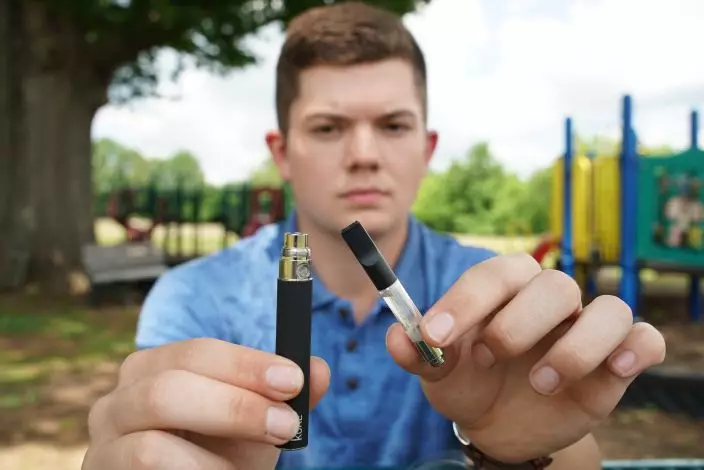
Jay Jenkins holds a Yolo! brand CBD oil vape cartridge alongside a vape pen at a park in Ninety Six, S.C., on Wednesday, May 8, 2019. Jenkins says two hits from the vape put him in a coma and nearly killed him in 2018. Lab testing commissioned by AP showed the vape contained a synthetic marijuana compound blamed for at least 11 deaths in Europe. Jenkins was interviewed as part of an AP investigation into the dark side to the booming CBD industry, in which some people are cashing in by substituting cheap and illegal synthetic marijuana for the natural cannabis extract. (AP PhotoAllen G. Breed)
Some operators are cashing in on the CBD craze by substituting cheap and illegal synthetic marijuana for natural CBD in vapes and edibles such as gummy bears, an Associated Press investigation has found.
The practice has sent dozens of people like Jenkins to emergency rooms over the last two years. Yet people behind spiked products have operated with impunity, in part because the business has boomed so fast that regulators haven't caught up while drug enforcement agents have higher priorities.
AP commissioned laboratory testing of the vape oil Jenkins used plus 29 other vape products sold as CBD around the country, with a focus on brands that authorities or users flagged as suspect. Ten of the 30 contained types of synthetic marijuana — drugs commonly known as K2 or spice that have no known medical benefits — while others had no CBD at all.
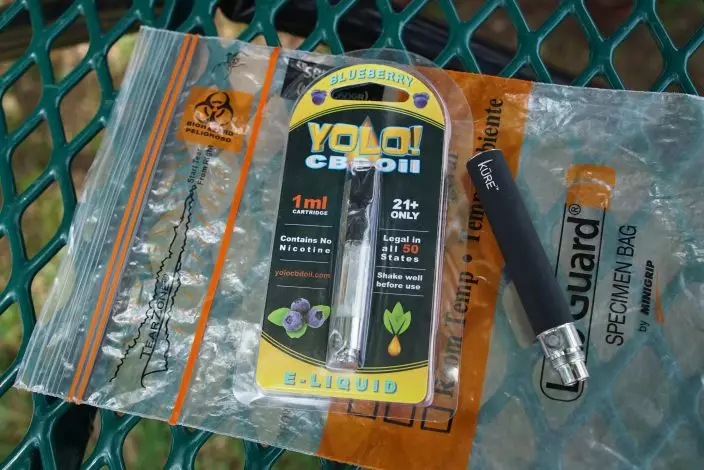
A Yolo! brand CBD oil vape cartridge sits alongside a vape pen on a biohazard bag on a table at a park in Ninety Six, S.C., on Wednesday, May 8, 2019. Jay Jenkins says two hits from the vape put him in a coma and nearly killed him in 2018. Lab testing commissioned by The Associated Press shows this cartridge and several other vapes marketed as delivering CBD instead contained synthetic marijuana, a street drug commonly known as K2 or spice. (AP PhotoAllen G. Breed)
Among them was Green Machine, a pod compatible with Juul electronic cigarettes that reporters bought in California, Florida and Maryland. Four of those seven pods contained illegal synthetic marijuana, but which chemical varied by flavor and even location of purchase.
"It's Russian roulette," said James Neal-Kababick, director of Flora Research Laboratories, which tested the products.
Vaping in general has come under increased scrutiny in recent weeks because hundreds of users have developed mysterious lung illnesses, and several have died. The AP's investigation focused on yet another set of cases, in which psychoactive chemicals are added to products presented as CBD.
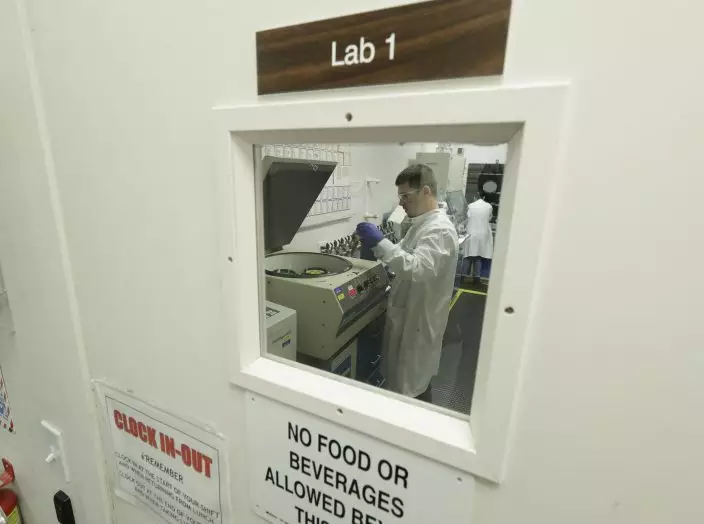
Researchers work at Flora Research Laboratories in Grants Pass, Ore., on July 18, 2019. The Associated Press commissioned the lab to test vape products as part of an investigation that shows a dark side to the booming industry selling the cannabis extract CBD. The lab tested 30 vape products sold around the country as CBD that AP chose by targeting brands that law enforcement authorities or users flagged as suspect. Ten of the 30 samples contained synthetic marijuana, a street drug commonly known as K2 or spice. (AP PhotoTed Warren)
The results of AP's lab testing echo what authorities have found, according to a survey of law enforcement agencies in all 50 states. At least 128 samples out of more than 350 tested by government labs in nine states, nearly all in the South, had synthetic marijuana in products marketed as CBD. Gummy bears and other edibles accounted for 36 of the hits, while nearly all others were vape products. Mississippi authorities also found fentanyl, the powerful opioid involved in about 30,000 overdose deaths last year.
Reporters then bought brands that law enforcement testing or online discussions identified as spiked. Because testing by both authorities and AP focused on suspect products, the results are not representative of the overall market, which includes hundreds of products.
"People have started to see the market grow and there are some fly-by-night companies trying to make a quick buck," said Marielle Weintraub, president of the U.S. Hemp Authority, an industry group that certifies CBD cosmetics and dietary supplements.
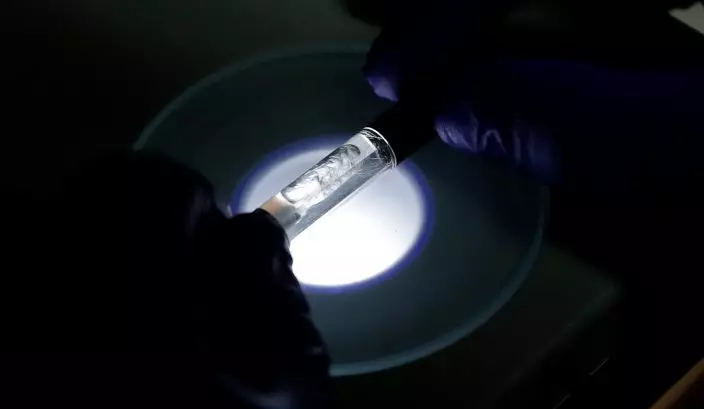
A Yolo! brand CBD vape oil cartridge is examined at Flora Research Laboratories in Grants Pass, Ore., on July 17, 2019. The Associated Press commissioned the lab to test that vape and 29 others as part of an investigation that shows a dark side to the booming industry selling the cannabis extract CBD. The Yolo cartridge and nine other samples contained synthetic marijuana, a dangerous street drug commonly known as K2 or spice. (AP PhotoTed Warren)
Synthetic marijuana is a concern, according to Weintraub, but she said the industry has many reputable companies. When products turn up spiked, the people or companies behind them often blame counterfeiting or contamination in the supply and distribution chain.
CBD, short for cannabidiol, is one of many chemicals found in cannabis, a plant known more commonly as marijuana. Most CBD is made from hemp, a cannabis variety cultivated for fiber or other uses. Unlike its more famous cousin THC, cannabidiol doesn't get users high. Sales of CBD have been driven in part by unproven claims that it can reduce pain, calm anxiety, increase focus and even prevent disease.
The U.S. Food and Drug Administration has approved one CBD-based medicine for treating seizures associated with two rare and severe forms of epilepsy, but says it cannot be added to food, drinks or dietary supplements. The agency is now clarifying its regulations, but aside from warning manufacturers against making unproven health claims, it has done little to stop the sale of spiked products. That's the job of the U.S. Drug Enforcement Administration, but its agents are focused on opioids and other narcotics.
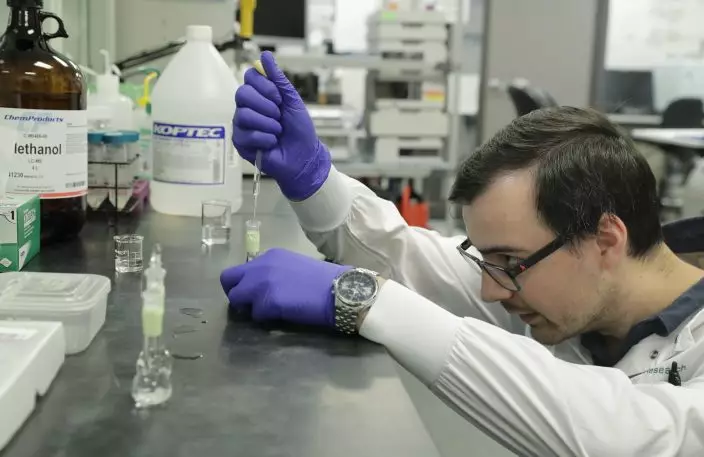
Pierce Prozy prepares a CBD vape oil test sample at Flora Research Laboratories in Grants Pass, Ore., on July 19, 2019. The Associated Press commissioned the lab to test 30 vape products marketed as delivering the cannabis extract CBD. The testing was part of an investigation that shows some people are taking advantage of gaps in federal regulation and law enforcement to exploit booming demand for CBD by substituting cheap and illegal synthetic marijuana for natural CBD. (AP PhotoTed Warren)
Now there are CBD candies and beverages, lotions and creams, and even treats for pets. Suburban yoga studios, big-name pharmacies and Neiman Marcus department stores carry beauty products. Kim Kardashian West had a CBD-themed baby shower.
But it's hard for consumers to know how much CBD they are really getting, if any at all. As with many products, federal and state regulators rarely test what's inside — for the most part, quality control is left to manufacturers.
And there's a financial incentive to cut corners. One website advertises synthetic marijuana for as little as $25 per pound — the same amount of natural CBD costs hundreds or even thousands of dollars.
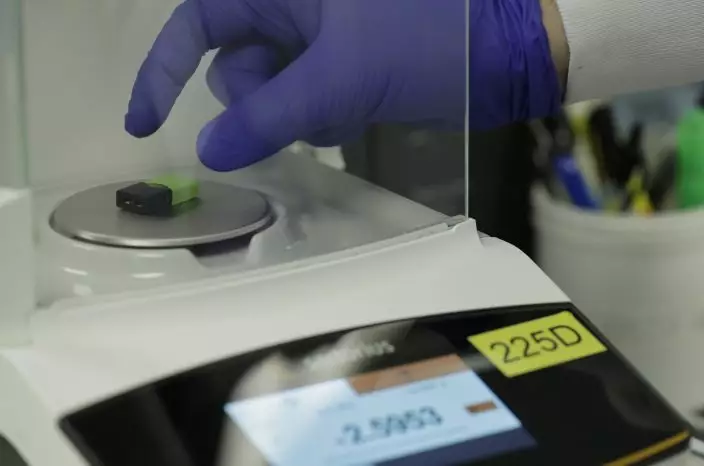
A Green Machine brand CBD vape pod is weighed during testing at Flora Research Laboratories in Grants Pass, Ore., on July 18, 2019. As part of an investigation into CBD vapes, The Associated Press commissioned the lab to test vape products purchased around the country, including seven Green Machine pods bought at stores in California, Florida and Maryland. Four of the Green Machine pods contained synthetic marijuana, a dangerous street drug commonly known as K2 or spice. (AP PhotoTed Warren)
'YOU ONLY LIVE ONCE'
Jay Jenkins had just wrapped up his freshman year at The Citadel, a South Carolina military college, when boredom led him to try what he thought was CBD.
It was May 2018 and he said his friend bought a cartridge of blueberry flavored CBD vape oil called Yolo! — the acronym for "you only live once" — from the 7 to 11 Market, an austere, white board-and-batten building in Lexington, South Carolina.
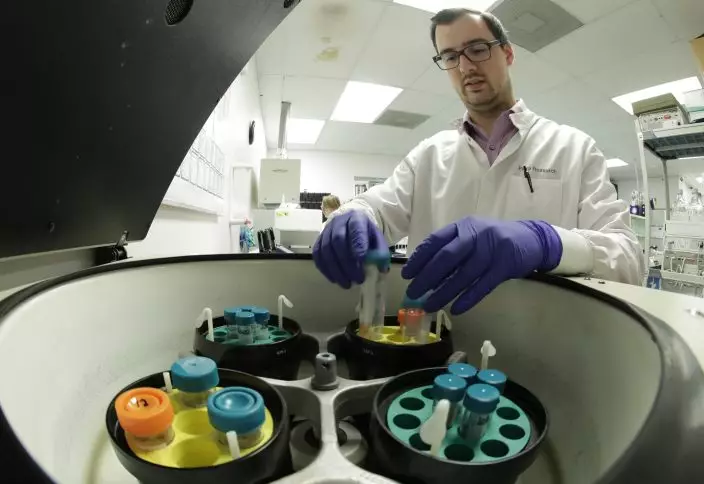
Pierce Prozy uses a centrifuge for CBD vape oil test samples at Flora Research Laboratories in Grants Pass, Ore., on July 18, 2019. The Associated Press commissioned the lab to test vape products marketed as delivering the cannabis extract CBD. AP chose the samples by targeting brands that law enforcement authorities or users flagged as suspect. Ten of the 30 samples contained synthetic marijuana, a dangerous street drug commonly known as K2 or spice. (AP PhotoTed Warren)
Back in the car, Jenkins tried it first. Things "got hazy," then terrifying.
Jenkins said the nerves in his mouth felt like they were "multiplied by 10." Vivid images including a circle engulfed by darkness and filled with colorful triangles filled his mind. Before he drifted out of consciousness, he realized he couldn't move.
"I thought that I actually was already dead," Jenkins said.
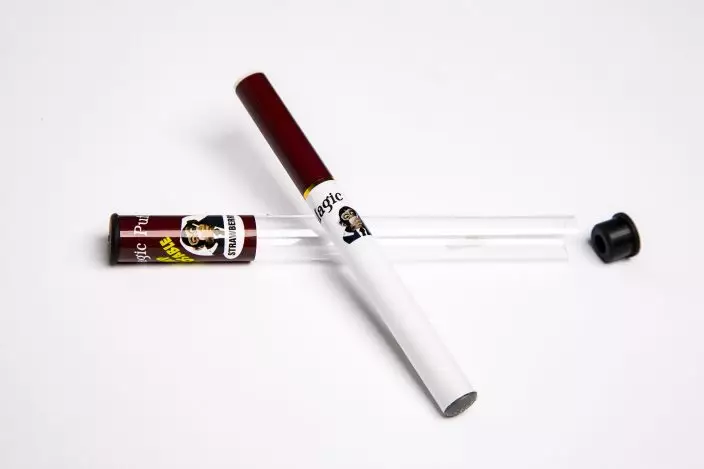
This Wednesday, July 17, 2019, photo shows a Magic Puff electronic cigarette and its packaging in Los Angeles. The product is labeled as a disposable hemp pen and was being sold as delivering the cannabis extract CBD at a store in Panama City, Florida, in July. Testing commissioned by The Associated Press as part of an investigation into CBD found it actually contained synthetic marijuana, a dangerous street drug commonly known as K2 or spice. (AP PhotoDamian Dovarganes)
His friend raced to the hospital where Jenkins suffered acute respiratory failure and drifted into a coma, his medical records show.
Jenkins came out of the coma and was released the next day. Hospital staff sealed the Yolo cartridge in a biohazard bag and handed it back.
Lab testing AP commissioned this summer found a type of synthetic marijuana that has been blamed for at least 11 deaths in Europe.
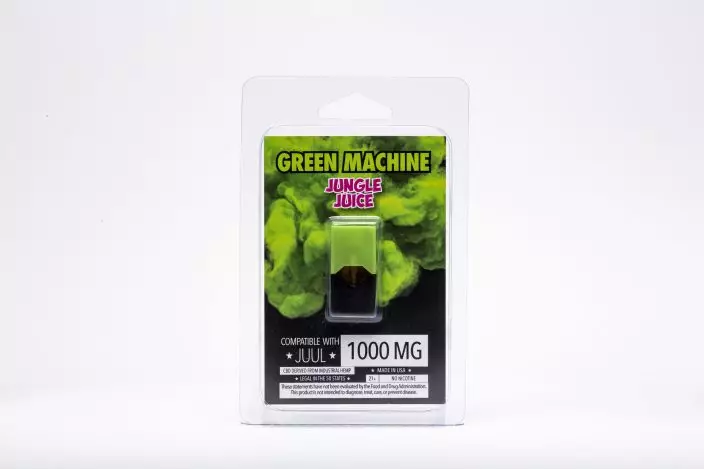
This Wednesday, July 17, 2019, photo shows a Green Machine "Jungle Juice" flavored CBD vape pod and its packaging in Los Angeles. As part of an investigation into vapes that promise to deliver a smokable form of the cannabis extract CBD, The Associated Press commissioned a laboratory to test CBD vapes purchased around the country. That included seven Green Machine pods bought at stores in California, Florida and Maryland; four of the pods contained synthetic marijuana, a dangerous street drug commonly known as K2 or spice. (AP PhotoDamian Dovarganes)
State and federal authorities never identified who made Yolo, which sickened not just Jenkins but also at least 33 people in Utah.
According to documents filed in a California court by a former company bookkeeper, a business called Mathco Health Corporation sold Yolo products to a distributor with the same address as the 7 to 11 Market where Jenkins stopped. Two other former employees told AP that Yolo was a Mathco product.
Mathco CEO Katarina Maloney said in an interview at company headquarters in Carlsbad, California, that Yolo was handled by her former business partner and she did not want to discuss it.
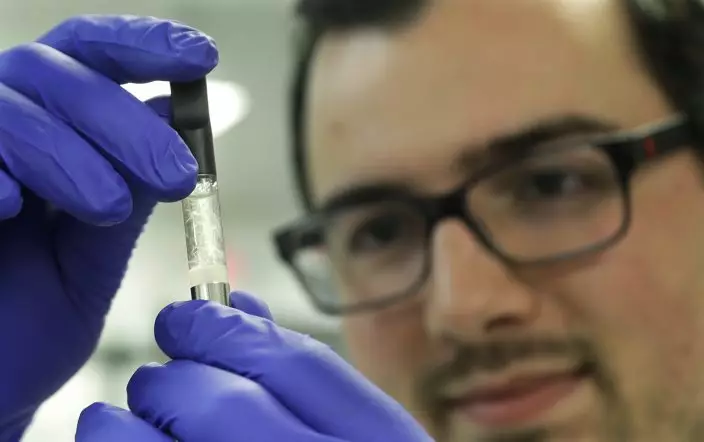
Pierce Prozy examines a Yolo! brand CBD vape oil cartridge at Flora Research Laboratories in Grants Pass, Ore., on July 19, 2019. The Associated Press commissioned the lab to test vape products marketed as delivering the cannabis extract CBD. AP chose samples by targeting brands that law enforcement authorities or users flagged as suspect. Ten of the 30 samples contained synthetic marijuana, a dangerous street drug commonly known as K2 or spice. (AP PhotoTed Warren)
Maloney also said Mathco does not "engage in the manufacture, distribution or sale of any illegal products." She said the Yolo products in Utah "were not purchased from us" and the company can't control what happens to products once they are shipped. AP-commissioned testing of two CBD vape cartridges marketed under Maloney's Hemp Hookahzz brand found no synthetic marijuana.
As part of an employment complaint filed in court records, the former bookkeeper said Maloney's former business partner, Janell Thompson, was the "exclusive salesperson" of Yolo. Reached by phone and asked about Yolo, Thompson hung up.
"If you want to speak with somebody you can talk to my attorney," Thompson later texted without providing a name or contact information.
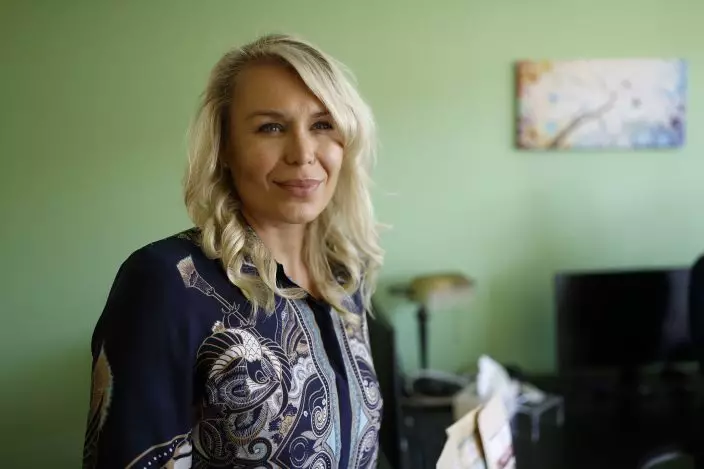
Katarina Maloney is pictured in her company’s offices in Carlsbad, Calif., on Aug. 27, 2019. Maloney is the CEO of Mathco Health Corporation, which sells products made with the cannabis extract CBD. Documents filed in a California court by a former employee, as well as interviews with two other former employees, link Maloney’s company to Yolo! brand CBD vape oil, a product that authorities blamed for sickening people in 2017 and 2018 because it was spiked with dangerous synthetic marijuana. Maloney said Mathco does not “engage in the manufacture, distribution or sale of any illegal products” and said the company can’t control what happens to products once they are shipped. (AP PhotoGregory Bull)
When a reporter visited the 7 to 11 Market in May, Yolo was no longer for sale. Asked for something similar, the clerk suggested a cartridge labeled Funky Monkey and then turned to a cabinet behind the counter and offered two unlabeled vials
"These are better. These are the owner's. This is our top seller," she said, referring to them as 7 to 11 CBD. "These here, you can only get here."
Testing showed that all three contained synthetic marijuana. The store owner did not respond to messages seeking comment.
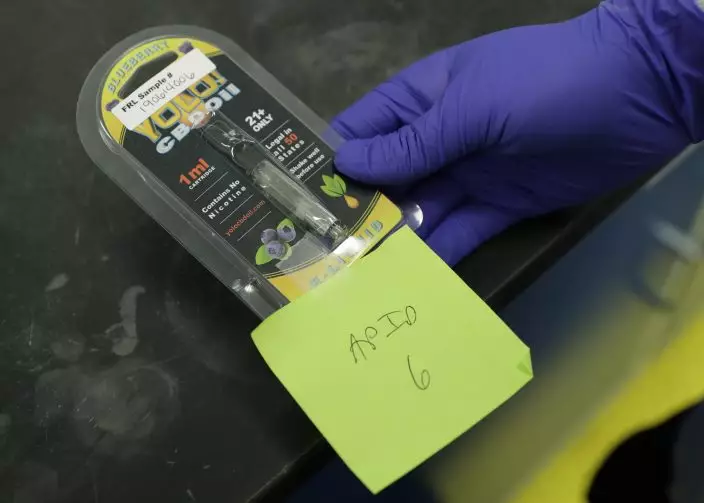
A researcher holds a Yolo! brand CBD vape oil cartridge and its packaging at Flora Research Laboratories in Grants Pass, Ore., on July 17, 2019. Authorities blamed Yolo for sending people to emergency rooms in Utah, saying it contained a dangerous synthetic marijuana. The cartridge pictured here was provided to The Associated Press by a South Carolina man who says he nearly died after puffing it. Testing commissioned by AP shows it contained the same synthetic marijuana that caused the illnesses in Utah. (AP PhotoTed Warren)
WHAT'S IN 'JUNGLE JUICE'?
The people behind spiked vapes leave few clues about who makes them or what's inside.
Packaging doesn't identify the companies and their brands have little online presence. Newcomers can simply design a label and outsource production to a wholesaler that deals in bulk.
The opaque system of manufacturing and distribution hampers criminal investigations and leaves victims of spiked products with little recourse.
The AP bought and tested Green Machine pods in flavors including mint, mango, blueberry and jungle juice. Four of the seven pods were spiked and only two had CBD higher than a trace level.
Mint and mango pods bought in downtown Los Angeles contained one type of synthetic marijuana. But while mint and mango pods sold by a vape shop in Maryland were not spiked, a "jungle juice" flavored pod was. It had yet a different synthetic marijuana compound — one health authorities blame for poisoning people in the U.S. and New Zealand. A blueberry flavored pod sold in Florida also was spiked.
Green Machine's packaging says it's made with industrial hemp, but there's no information about who is behind it.
When a reporter returned to CBD Supply MD in a Baltimore suburb to discuss testing results, co-owner Keith Manley said he was aware of online chatter that Green Machine might be spiked. He then had an employee pull all remaining Green Machine pods from store shelves.
Through interviews and documents, AP tracked Green Machine pods that reporters bought to a warehouse in Philadelphia and then a Manhattan smoke shop and the entrepreneur behind the counter, Rajinder Singh, who said he is Green Machine's first distributor.
Singh, who is currently on probation for a federal synthetic marijuana conviction, said he purchased Green Machine pods with cash or in exchange for merchandise such as hookah pipes from a man he knew as "Bob" who drove a van down from Massachusetts. To substantiate his account, he provided a phone number associated with a man who died in July.
Singh pleaded guilty in 2017 to federal charges he sold a smokable "potpourri" that he knew contained synthetic marijuana. He said that experience taught him a lesson and blamed counterfeit products for the synthetic marijuana detected in Green Machine.
"100 percent, what you tested is a duplicated product," he said.
'EMERGING HAZARD'
The American Association of Poison Control Centers considers CBD an "emerging hazard" due to the potential for mislabeling and contamination.
One case last year involved an 8-year-old boy from Washington who was hospitalized after taking CBD oil his parents ordered online in hopes it would help his seizures, according to a case study in the journal Clinical Toxicology published in May. Instead, synthetic marijuana sent him to the hospital with symptoms including delirium and a rapid heart rate.
Other clusters of illnesses happened in Mississippi and around military bases in North Carolina.
Labeling of many CBD products has been documented as inaccurate. A 2017 study in the Journal of the American Medical Association found 70% of CBD products were mislabeled. Researchers used an independent lab to test 84 products from 31 companies.
Fake or spiked CBD is enough of a concern that leaders of the U.S. Hemp Authority industry group developed a certification program for CBD skin and health products. Vapes are not covered.
But local and state authorities have limited ability to pursue problem products to their roots.
After several Georgia high school students passed out from vaping last year, authorities began scrutinizing local tobacco shops. One of the CBD vape brands they targeted was called Magic Puff.
The drug enforcement team in Savannah and surrounding Chatham County arrested a shop owner and two employees. But they couldn't follow the investigation further because it appeared the products were being manufactured elsewhere, possibly overseas. The team's assistant deputy director, Gene Harley, said they provided a report to federal drug agents who handle such cases.
Magic Puff was still on shelves at a Florida store this summer, and AP testing showed blueberry and strawberry cartridges contained synthetic marijuana. Preliminary results also suggested the presence of a toxin produced by a fungus.
Because CBD is the active ingredient in an FDA-approved drug, the FDA is responsible for regulating its sale in the U.S. But if CBD products are found to contain narcotics, the agency considers the investigation a job for the DEA, an FDA spokesman said.
The DEA says it is focused on drugs responsible for killing thousands of Americans like fentanyl and methamphetamines.
"These are going to be bigger priorities on enforcement," DEA spokeswoman Mary Brandenberger said.
Experts such as Michelle Peace, a forensic scientist at Virginia Commonwealth University who has found synthetic marijuana in her own testing of CBD vapes, said the federal government should act quickly to protect the public.
"As long as it remains unregulated like it currently is," Peace said, "you just give a really wide space for nefarious activity to continue."
Contact AP's investigative team at Investigative@ap.org.
People experiencing problems with a product labeled as CBD can reach a local poison control center by calling 1-800-222-1222.











